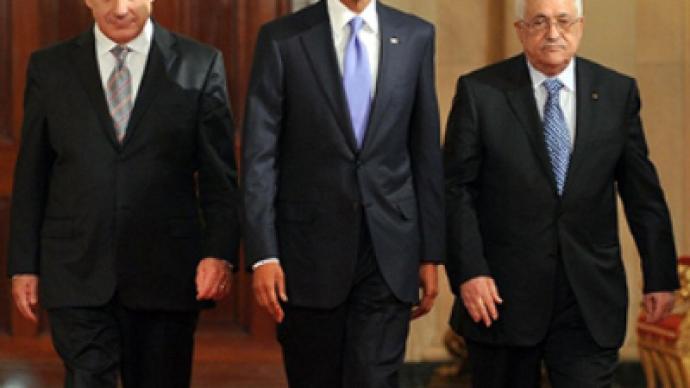Peace brokers pray for miracle in the Holy Land

Following a two-year collapse in direct talks, the leaders of Israel and Palestine met in Washington on Thursday where they began the formidable task of brokering a two-state solution.
In light of the seemingly insurmountable challenges that await negotiators, getting Israeli Prime Minister Benjamin Netanyahu and his Palestinian counterpart Mahmoud Abbas to agree to sit at the same table in Washington was the easy part.
Now the two sides will go head-to-head over a multitude of contentious issues, including the presence of “illegal” Israeli settlements on claimed Palestinian territory; East Jerusalem, which the Palestinians envision as the capital of their future state; and the formal recognition of the state of Israel, which some Palestinian groups like Hamas have challenged in the past.
US Secretary of State Hillary Rodham Clinton formally opened the negotiations by affirming that a permanent peace between the two parties – which she said the Obama administration is committed to achieving in one-year’s time – is in the national security interest of the United States.
“We believe,” Clinton told the delegates assembled in the State Department's elegant Benjamin Franklin room, “that you can succeed and we understand that this is in the national security interest of the United States that you do so.”
The Secretary of State, whose husband also tried to broker a peace agreement in the final year of his presidency, added that the United States would be an “active partner” in the talks, but would not “impose a solution,” which must come about through the efforts of the Israeli and Palestinians.
“For our part, the United States has pledged its full support for these talks, and we will be an active and sustained partner,” Clinton announced in her opening remarks. “But we cannot and we will not impose a solution. Only you can make the decisions necessary to reach an agreement and secure a peaceful future for the Israeli and Palestinian people.”
Mahmoud Abbas, Palestinian President, said he was prepared to address the many thorny issues now thwarting a two-state solution and end the Israeli occupation of Palestinian territory that started in 1967.
“We will work on all the final status issues – Jerusalem, the settlements, the borders, security…in order to end the occupation that started in 1967,” Abbas said, adding that he looked forward to the creation of a “state of Palestine that lives side-by-side with the state of Israel” that brings “peace and security for the two peoples and all the peoples in the region.”
Israeli Prime Minister Benjamin Netanyahu said he understood the “rare opportunity” for finally delivering peace to the region, which has seen nations and people hotly divided over the question of Palestinian statehood.
“President Abbas, history has given us a rare opportunity is given us to end the conflict between our peoples, a conflict that has been lasting for almost a century,” Netanyahu said. “It's an unprecedented opportunity to end a century conflict…and to secure a future of promise and hope for our children and grandchildren.”
Thursday's talks came on the heels of an official dinner on Wednesday night at the White House that was hosted by US President Barack Obama. In attendance were Egyptian President Hosni Mubarak, Jordan's King Abdullah II, Middle East Quartet Representative Tony Blair, and, of course, Abbas and Netanyahu.
“I am hopeful – cautiously hopeful, but hopeful – that we can achieve the goal that all four of these leaders articulated,” Obama told the assembled senior officials.
Egyptian President Mubarak, with whom Netanyahu has forged a close relationship, reminded the Israeli leader that he would soon be put to the test and challenged Netanyahu to make good on his peace pledges.
“I met Netanyahu a few times since his election,” Mubarak told the attendees. “He told me again and again he was serious and wants peace. Now is the time to show it.”
The Middle East Quartet consists of the United States, Russia, the United Nations and the European Union.
Some political commentators say the biggest success to emerge from Thursday’s talks was that an agreement was achieved for a second round of negotiations.
The leaders are scheduled to meet again on September 15 in the Egyptian Red Sea resort of Sharm el-Sheikh
Violence and rhetoric threaten peace
Besides the obvious hurdles that need to be overcome before any peace deal can be signed (most ominous is Netanyahu’s halt on settlement construction in the West Bank, which is set to expire on Sept. 26. The Israeli leader has refused to extend the moratorium, and this alone is enough to sink the talks before they get off the ground, not to mention split Netanyahu’s hawkish Likud party), both sides have a host of hotheads that are determined to derail the fragile negotiations.
Rabbi Ovadia Yosef, spiritual head of the religious Shas party in Israel's government, gave a provocative sermon as Middle East peace talks were gearing up.
The 89-year-old rabbi – founder of the ultra-orthodox Shas Party – told his congregation: “Abu Mazen [the name given to Palestinian President Abbas] and all these evil people should perish from this earth.”
“God should strike them and these Palestinians – evil haters of Israel – with a plague,” Yosef added.
A statement from the Israeli leader’s office said: “The comments do not reflect Prime Minister Benjamin Netanyahu's view or the position of the government of Israel.”
It added that the Israeli leader is going to the peace talks with the intention of “reaching an agreement with the Palestinians that will put an end to the conflict.”
Meanwhile, Israeli Foreign Minister Avigdor Lieberman, who founded the nationalist Yisrael Beiteinu party, said on Wednesday that settlement building in the West Bank should resume after a ten-month freeze expires on Sept. 26.
“We cannot punish tens of thousands of citizens who have served in the army and live in legal communities,” Lieberman said. “We should take natural growth into consideration, as did the previous administration.”
The Palestinians also have their share of factionary groups determined to disrupt the peace talks. Hamas gunmen killed four Israeli residents of a West Bank settlement on Tuesday as the peace talks were just convening in Washington.
And on Wednesday, hours before the leaders joined for dinner at the White House, gunmen injured two Israelis as they drove in their car in another section of the West Bank.
Despite the many groups who are committed to derailing the talks, the important thing is for the leaders not to allow the incessant chatter of “doomed talks” to become a self-fulfilling prophecy.
Both sides will have to move past the distrust that remains after years of violence and deadlock.
Finally, both sides in the peace talks must understand that the international community, which has far greater interest in resolving the conflict thanks to the growing specter of global terrorism and the spread of weapons of mass destruction (not to mention recent incidences, including Israel’s interception of a Gaza-bound Turkish ship loaded with humanitarian aid that resulted in the death of nine pro-Palestinian activists), will be carefully monitoring the progress of the talks and casting judgment accordingly.













